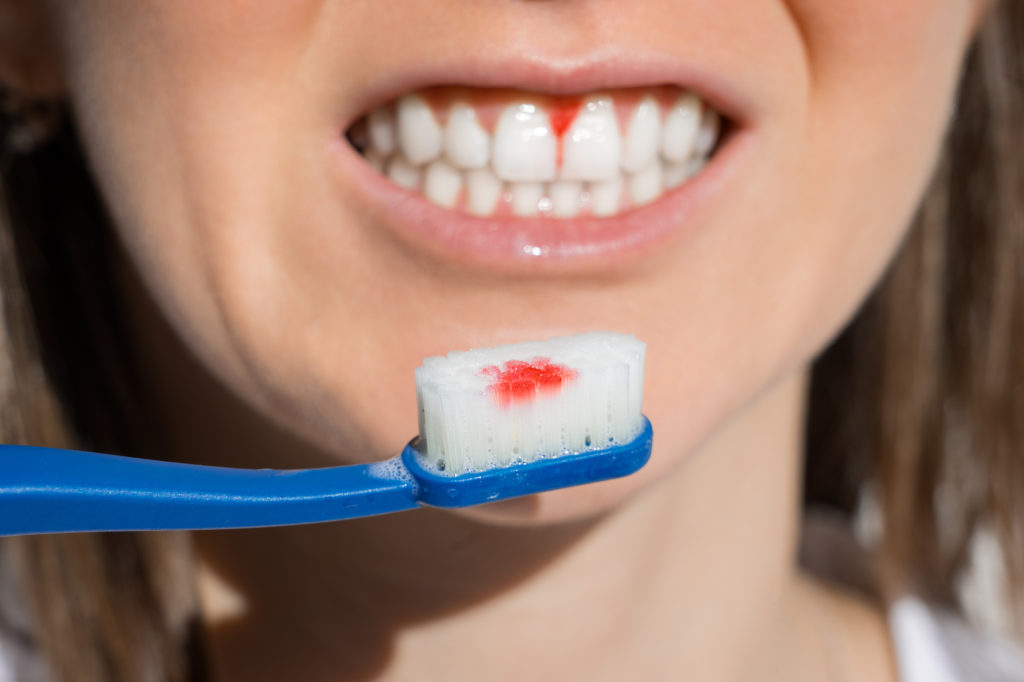
Bleeding gums can be disconcerting, so it’s important to know what you should do if you experience bleeding gums when brushing or flossing your teeth.
Why Do My Gums Bleed When I Brush My Teeth or Floss?
At some point or another, nearly all of us have spit after brushing, seen that telltale red color, and thought, “Why are my gums bleeding?” As it turns out, there could be a lot of different reasons for bleeding when brushing teeth.
That’s why it can be helpful to review them all so you know which concern applies to you. Some causes of bleeding are easily remedied, while others may require further investigation.
So what does it mean when your gums bleed? Most often, bleeding gums mean that something is off in your oral hygiene or oral care routine. However, there may also be other causes of bleeding when brushing.
Common Causes of Bleeding Gums
Most of the time, bleeding gums are caused by your brushing technique or by some form of gum disease.
In fact, bleeding gums are the most common sign of gum disease and, according to the Centers for Disease Control and Prevention (CDC), some form of gum disease impacts 47.2% of adults aged 30 and older. That means that gum disease is incredibly common, which means bleeding gums are common as well.
Still, there are a variety of common causes of bleeding gums when brushing. Below are the top 10 reasons your gums bleed:
- Brushing your teeth too hard.
- Brushing with an old toothbrush with worn bristles.
- Dentures or dental restorations that fit incorrectly.
- Flossing incorrectly or infrequently.
- Gingivitis, or the early stage of gum disease.
- Taking certain medications
- Periodontitis, or serious gum disease.
- Pregnancy, which can cause inflamed gums (pregnancy gingivitis).
- A tooth abscess, which can cause bleeding, inflamed gums, and significant pain.
If your gums only bleed periodically, it’s likely a sign that you need to brush and floss more carefully and regularly.
If the bleeding is a sign of gingivitis, your dentist can help you get back on track with your dental health and hygiene. Similarly, if the bleeding is caused by brushing or flossing technique, your dentist can give you tips to ensure you’re getting the most out of your flossing and brushing, without damaging your gums.
If the issue is due to your dentures or dental restorations, your dentist can help you resolve that issue as well. However, if your dentist is unable to determine the cause, you may need to visit your primary care physician to learn more.
Diseases Associated with Bleeding Gums
Sometimes, even after you’ve been to the dentist and gotten a clean bill of dental health and technique, you may still ask, “Why do my gums bleed when I brush my teeth?” What could lead to bleeding and cause further long-term damage to my teeth?
At that point, it’s important to see your primary care doctor to find out. While gum disease is often the cause of bleeding gums, bleeding gums can also be a symptom associated with a number of different diseases and health concerns.
Here’s what to ask your doctor about if you have healthy teeth and gums, but still experience bleeding gums when brushing:
- Diabetes: Bleeding and swollen gums are a sign of both type 1 and type 2 diabetes. Additionally, since diabetes impacts your ability to fight germs, people living with this disease are more prone to gum disease.
- Hemophilia: This blood-clotting condition can cause bleeding gums, along with significant bleeding from even small cuts or regular dental work.
- Insufficient vitamin C: Vitamin C is essential to help your body grow and repair tissue and keep your bones and teeth strong. Without sufficient vitamin C, your gums can’t heal properly. With severe and dangerous vitamin C deficiency (also called scurvy), bleeding gums are common.
- Insufficient vitamin K: If your gums are bleeding a lot, it might be because you’re not getting enough vitamin K. Lack of this vitamin can impact your blood’s ability to clot.
- Leukemia: Leukemia affects your blood platelet count, which makes it harder for your blood to clot correctly. That can make you more prone to ongoing bleeding, including in your gums.
- Thrombocytopenia: This is another condition in which your body doesn’t have sufficient platelets for your blood to clot, causing excess bleeding throughout the body, including in your gums.
How to Stop Bleeding Gums
- Practice consistent, excellent oral hygiene. Brush your teeth twice per day for two minutes each time with a dentist-recommended toothpaste. You should also floss once per day, using the correct technique.
- Use the right toothbrush and floss for you. You could be making your gums bleed because your toothbrush is too old, too hard, or just not right for your mouth. Similarly, you may need to try a different type of floss if the kind you currently use causes you to hurt your gums.
- Go to the dentist regularly. Professional dental cleanings and checkups are an important part of keeping your gums healthy. Don’t skip appointments and see your dentist as often as they suggest.
- Review your brushing and flossing techniques with your dentist. Sometimes, patients think they’re doing everything right, but a quick review with their dentist becomes an “Aha!” moment. Flossing and brushing correctly (and regularly) should never cause your gums to bleed.
- Watch your diet. Even if you have perfect oral hygiene, too many sugary or acidic foods or beverages could cause problems. A lack of vitamin C or vitamin K can also result in bleeding gums.
- Stop smoking. Smoking wreaks havoc on your entire body, including your mouth. Smokers are prone to gum disease and increased plaque.
- Keep your microbiome in check. Your mouth is a complex ecosystem of helpful and harmful bacteria. Make sure you’re not killing off healthy microbes by constantly using antiseptic products. Eat healthy foods and drink plenty of water so harmful bacteria don’t get overfed.
- Rinse with salt water. Rinsing with salt water can help reduce harmful bacteria and help stop bleeding.
A proper oral hygiene routine is the most important step for stopping bleeding gums. This not only resolves other problems, like causes of bad breath and tooth decay, but it ensures that your mouth and gum tissues stay healthy.
Start by brushing properly, twice per day, with a clean, soft toothbrush that you replace every three months. If you experience gum or tooth issues, be sure to use a soft-bristled toothbrush.
Floss once every day, but carefully, since flossing too hard causes bleeding.
Floss properly by bringing the floss gently down between your teeth and hugging the tooth on each side as you bring the floss back out.
Make sure you visit your dentist once every six months, or more often if requested, for a thorough cleaning and check-up of your teeth and gums.
Quit bad habits like smoking immediately. Smoking makes you significantly more prone to gum and periodontal disease.
After improving your oral health, check in with your doctor to find out if something else is going on. It’s important that you get professional cleanings every six months as well.
Get yourself on a regular schedule to reduce the risk of tooth loss and decrease the chances of your gums bleeding when you brush.
Don’t panic, as bleeding when brushing your teeth could be a sign of any number of issues, many of which are easily remedied.
However, if they are a symptom of something more serious, finding out as early as possible is helpful. Your mouth is the gateway to your body, after all, so keep both your oral health and the health of your entire body on track.
Sources:
https://www.cdc.gov/oralhealth/conditions/periodontal-disease.html
https://www.mouthhealthy.org/en/az-topics/b/bleeding-gums
https://www.mouthhealthy.org/en/common-myths-of-gum-disease
https://www.medicalnewstoday.com/articles/324613#not-smoking
https://www.webmd.com/oral-health/teeth-and-gum-care
https://www.healthline.com/health/how-to-stop-bleeding-gums#1.-Practice-good-oral-hygiene

